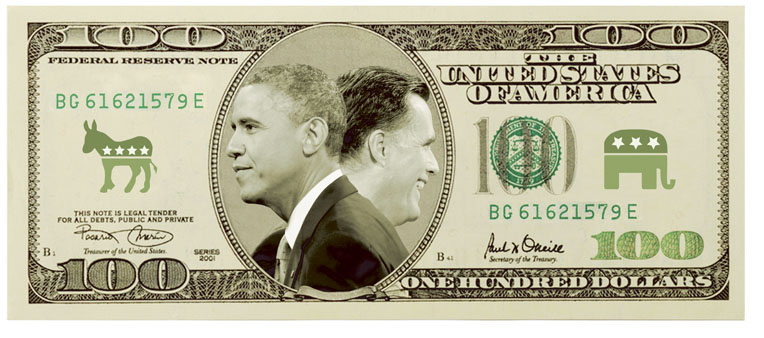The two presidential candidates said they had nearly $300 million in the bank for the final leg of the campaign, raising a simple question: What in the world are they going to do with all that money?
The answer, of course, is that they are going to spend it — at a rate never seen before in the annals of American politics.
In previous presidential contests, candidates such as Democrat John Kerry or Republican Bob Dole often began pulling back from broad swaths of the country near the end of the race to focus their dwindling resources on the most contested states. Most candidates since the 1970s also have been constrained by voluntary public financing limits that kept a lid on how much money they had available.
President Obama and Republican nominee Mitt Romney, by contrast, have money to burn and have shown every sign of setting fire to it.
The Romney campaign and the Republican National Committee had a combined reserve of $169 million cash on hand as of Oct. 17, according to the last full disclosure report before the Nov. 6 election. The Obama campaign and the Democratic National Committee together had $125 million.
That money would allow the two campaigns to spend about $16 million a day through the election, and that doesn’t count the millions more that each side has continued to raise since the mid-October tally.
The totals also don’t include the well-funded super PACs and nonprofit groups spending big on behalf of the two candidates, particularly Romney.
Restore Our Future, a pro-Romney super PAC, spent about $31 million a week on ads in early October and has booked another $40 million in ads through Election Day.
Some of the money on the campaign side will be used for get-out-the-vote efforts, particularly in key swing states, not to mention costs for a blizzard of candidate travel, rallies and other last-ditch events. One complication that emerged last week was Hurricane Sandy, which stalled campaigning and fundraising by both candidates as it battered the Eastern Seaboard.
But the bulk of the cash during the final stretch goes to the most expensive line item in any campaign’s budget: broadcast advertising. Even after months of saturation-level advertising in Ohio, Virginia, Florida and other key states, both sides further escalated their spending in the hope of persuading undecided independents or moving more of their avid supporters to the polls.
“Most of it will go to TV,” Republican strategist Mark McKinnon said about campaign spending in the homestretch. “And most of it will be wasted.”
The campaigns and outside groups, who already aired more than $50 million per week in ads in early October, have increased expenditures further in the final days, particularly in states such as Ohio, Florida and Wisconsin. The Republicans have outpaced the Democrats in ad spending for weeks, but studies show Obama has been able to keep pace in the number of commercials aired by taking advantage of discounts and choosing cheaper time slots.
Both campaigns also have sent signals this week that they intend to throw resources at states that seem like long shots.
The two camps each made modest ad purchases in Minnesota, which is considered a likely Obama win but has shown tighter polling recently. Vice President Biden even added Minnesota to his travel itinerary.
Restore Our Future also made a $2.1 million purchase in Pennsylvania, a state that has been written off for months as a near-certain Obama victory. The Republican super PAC has spent more than $5 million in the Keystone State this cycle, and has also spent millions in blue-leaning Michigan.
The Obama campaign scoffed at the purchase as a sign of GOP desperation, but also said it would counter with a Pennsylvania buy of its own.
Political strategists say the reason for such behavior is simple: Campaigns and their surrogates strive to spend every dime by Election Day in the hope that something will give them an edge. The Obama campaign, which has raised a bit more than $1 billion with the DNC, even took out a $15 million credit line this fall, just in case it needs a little extra.
“We’re not taking anything for granted,” Obama adviser David Axelrod told reporters earlier this week.
Send questions/comments to the editors.



Success. Please wait for the page to reload. If the page does not reload within 5 seconds, please refresh the page.
Enter your email and password to access comments.
Hi, to comment on stories you must . This profile is in addition to your subscription and website login.
Already have a commenting profile? .
Invalid username/password.
Please check your email to confirm and complete your registration.
Only subscribers are eligible to post comments. Please subscribe or login first for digital access. Here’s why.
Use the form below to reset your password. When you've submitted your account email, we will send an email with a reset code.